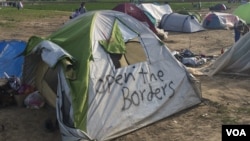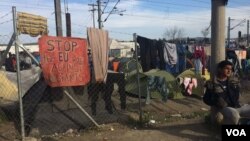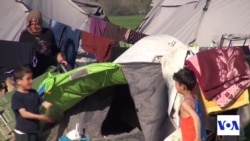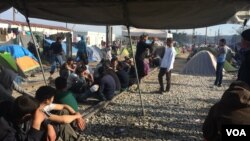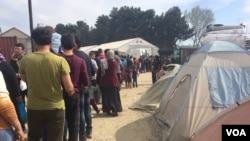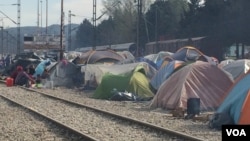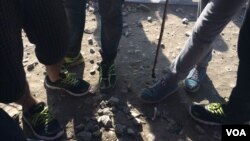On a Thursday afternoon, police in riot gear lounge inside armored buses as people sit on train tracks in protest.
New signs in English say, “We demand a peaceful place to live,” and “We don’t demand food and water. We demand to OPEN the BORDER.”
Small though it may be, keeping a train line between Greece and Macedonia closed in protest is the only leverage these refugees have to try to convince officials to open the borders, Rami, a 26-year-old car mechanic from Syria, tells VOA.
“We don’t want to demonstrate,” he said, adding, “We just want to go.”
For more than a month, this border area in Greece has been packed with thousands of people seeking to go to Western Europe, following the more than a million people who migrated last year.
Now stuck in Greece, refugees and other migrants who traveled by rubber boat in the dead of winter say they are trapped. Even if they wanted to go back, they spent nearly all their money on smugglers to get to Europe.
And for Rami, who has two small children, staying in the camp, in dangerously squalid conditions, is also not an option.
“The people here will not leave the train tracks until the border is opened,” he says, explaining that when one person leaves, someone else replaces that individual. “We’re doing this for the women and children.”
Watch: Heather Murdock's report from Idomeni.
Many people believe their stamina, the sheer force of their determination, will eventually open that border. Others say alternate solutions must be found because life in this unplanned camp, where masses of people are becoming increasingly exhausted and ill, is not sustainable in the long term.
And constant rumors of possible border openings serve only to prolong the agony, says Marco Rivas, an independent volunteer from Spain who arranges activities and lessons for the children, all long out of school.
“The Macedonian government has decided to put more police and more army along the borders,” he said. “So it’s a clear reason to know that they are not opening the border.”
Bitterness grows
Tents and walls of makeshift aid buildings are littered with graffiti, saying things like “Open the Borders,” “Stop the EU War Against Migrants,” and more explicit language describing what people here think of the “racist borders.”
The bitterness and sorrow are palpable.
As the days drag on with no sign of the border opening, it only becomes harder. One man showed VOA a handwritten flyer in Turkish.
“I want to go back to Turkey,” says Adnan Fenesh, a 26-year-old who fled Islamic State militants with his three-year-old daughter, and is now out of money. “They said call this number for help.”
Other refugees say they tried to re-enter Turkey by land and were refused.
When asked about the European Union plan to send migrants back to Turkey for free, Taha, a Syrian interpreter who lives in the camp, shakes his head and laughs. “That’s not true,” he says, not believing it will happen.
One teenager who snaps his fingers to the beat of his words says the camp is worse than what he fled - Islamic State-controlled Syria. If he doesn’t get into Macedonia this week, he wants to go back home.
When asked if Islamic State would kill him if he was there there and did not fight with them, his response was simple: “Then I will die.”
Xenophobia
Over by the train tracks, other refugees say besides being blocked from moving forward without the means to go back, they are relegated to quiet protests they hope will gather international sympathy.
Besides being unarmed, under-fed civilians, refugees are keenly aware of growing xenophobia in Europe after the terrorist attacks in Paris and Brussels, says Basil, a 26-year-old who worked in construction with his father in Syria. They don’t want to give anyone an excuse to call them violent.
“The people here are not terrorists; they ran from terror,” he says, repeating a refrain often heard among refugees attempting to stem the tide of racism. “These people will never harm the police.”
On Tuesday, clashes between migrants and the police were reported from Idomeni as police attempted to clear out the protest. On the train tracks, the young men insist they weren’t fighting, but rescuing a woman from being grabbed by the police.
Rami, the auto mechanic, pulls down his shirt, revealing a bruise on his shoulder he says police inflicted on him in the scuffle.
“They were grabbing a woman,” he says. “We grabbed her back.”
Camps
Government camps are another option for the tens of thousands of people massed in Idomeni. In theory, refugees are welcome, even encouraged to go to camps via buses provided near the border. Conditions in the camps are supposedly better than here, where there’s not enough food and clean water or medical supplies.
As refugees continue to arrive in Greece by the hundreds almost every day, the camps have become increasingly militarized.
Refugees say if they go to a camp, they may not be able to leave.
“I will stay here until the border opens because there is no going back,” said Mohammad el-Shahaby, a 30-year-old father of two. “And the camp is not a solution.”
A few of his travel companions opted for the camp to escape the squalor of this border area, and haven’t been allowed to leave for the past four days. Without any real information, el-Shahaby says his only choice is to wait and hope.
Hope, however, is slowly fading for many, said Rami. The media en masse covered this camp earlier in March, as protests turned to clashes when the border closed.
Even then, the young men told me, the police spokesmen received more media attention than the humanitarian crisis they are living. Nowadays, reporters still appear in Idomeni, says Basil, who says he doubts that they are sympathetic to the people. Otherwise, how could the world abandon them?
“The people in the world just must not see the real situation here,” Rami said.
And new signs at the protest echo his confusion. Refugees say they wonder why the world's outpouring of sympathy for the child Alan Kurdi, whose body was photographed on a Turkish beach last year, doesn’t seem to extend to those stuck here.
“European people,” it reads, “You already cried on the death of the child Alan. Now we are dying here in Idomeni. Dying slowly…”




